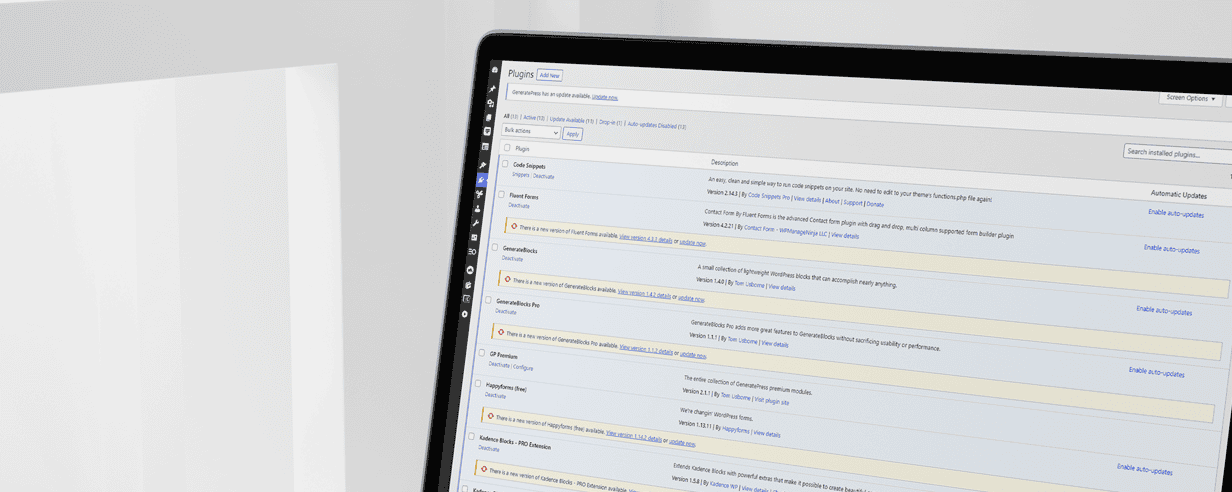I’ve had several customers question why there some ongoing costs related to their website. Because WordPress itself is free, there is some confusion as to why they would need to pay for licensing on some of the software used to build their website.
There have even been times when a client is considering my bid and another developer’s who didn’t mention any ongoing fees. While it is possible to build a site that can stay updated and secure without spending money on WordPress software licenses, it’s also limiting (and not that common).
I think some developers hide these costs in order to secure a project, but in the long run this can be damaging to the relationship and cause resentment. I much prefer my customers to understand as much as possible upfront so there are no surprises.
It all gets a bit complex, so I decided to write something up to help make how the system works clear and when and why I use premium (paid for) software within my WordPress website builds.
Isn’t WordPress Free?
WordPress is the ecosystem/platform that the websites are built on. This is free and open-source (meaning anyone from around the world can contribute to it). What can be done with WordPress out of the box is a bit limiting unless you are well versed in coding languages like HTML, CSS, PHP, etc.
To give the sites more than the basic functionality, you actually need quite a bit of code. Developers have created and shared code they developed with the community (most commonly in the form of Themes and Plugins). Some of which they offer for free, and some you have to pay for.
Understanding how all this works can be a bit confusing—but there is actually a good reason why you might actually want to use software that has additional costs.
Let’s take a look at the pros and cons of free and premium software, as well as it’s hybrid combination we call “freemium”.
Free Plugins
Some free plugins can be great. There are some simple but effective plugins that have a long track record of being stable. Some, however, never get updated and become vulnerable to security issues or stop functioning when other updates have a conflict. If the developer isn’t being paid to keep the plugin updated there are less incentives for them to continue putting work into the software.
Premium (Paid for) Plugins
Premium plugins are generally a “safer” choice (and have more ability). This is due to the fact that the developer is actively getting paid to maintain and update the product over time. In order for them to continue to make money from their work, they have to keep the software up to date.
Freemium Plugins
Often premium plugins will have free versions of their software (we typically refer to this as “freemium” a mix of “free” and “premium”). They are usually stripped of some of the most powerful features as a way to let you “test” the product without having to buy the whole thing. These are usually stable as they are a marketing tool for their paid product (which gives them incentive to keep them working properly). There are lots of times when the free version of a premium plugin will do all we need.
What Should You Expect to Pay?
The costs for different pieces of software can vary greatly. Typically the software is paid for by purchasing a license for 1 year (which can be renewed, often at a discounted rate), some you can purchase lifetime use— it all just depends on how the software creator setup their pricing structure. Some software is only a few dollars a year, while some can be several hundred— it all depends on the complexity of the software you’re purchasing.
My Approach to WordPress Software
I always try to be very careful of the software I use to ensure the long-term stability of the website. I do my best to be budget-conscious of ongoing costs, but in places where I feel the risk outweighs the price— I’ll opt for a premium (paid) piece of software to ensure we can achieve the functionality and reliability we’re looking for for the long term health of your website.
Having spent pretty much every day for the last several years inside WordPress, I’ve tested and toyed with a huge number of plugins and themes— and continue to do so. My goal is to find the perfect balance of cost-efficiency with reliability & functionality. I don’t see any reason for either of us to spend money on software that isn’t necessary to achieve our goals. I will always do my best to provide you with the solutions that I believe are the best for your unique situation. This is most often achieved with a combination of free, premium, and freemium software.
The typical stack of software I build most sites with uses around $600 per year worth of licensing fees. However, as a developer I typically purchase an extended license that allows me to use the software on multiple websites that comes at a discounted “bulk” rate. If a client signs up on for my Continued Success Program I can continue to use my licensing on their website as long as it is still under my care. Many of my customers like this option because they don’t have to keep up with individual licenses for all the software (I take care of all of that form them) and they can enjoy the benefits of discounted rates from my extended license (along with all the other benefits the Continued Success Program provides).




